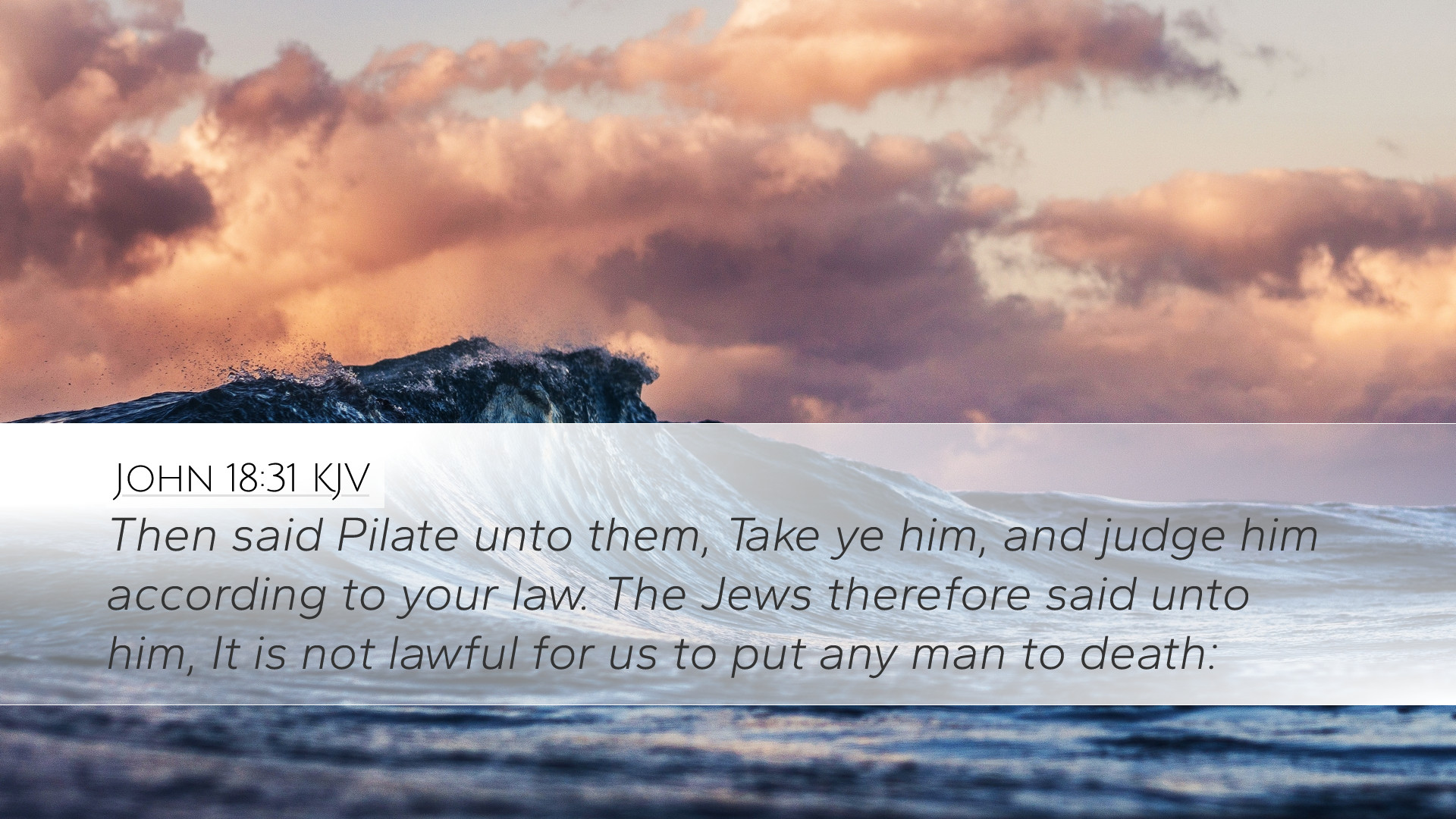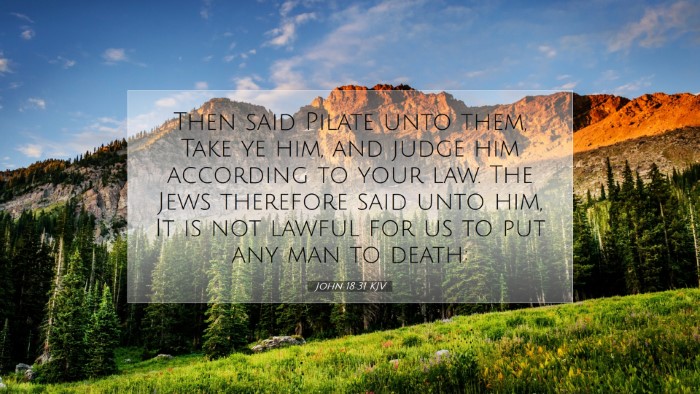Commentary on John 18:31
Verse Reference: John 18:31
"Then said Pilate unto them, Take ye him, and judge him according to your law. The Jews therefore said unto him, It is not lawful for us to put any man to death."
Introduction
The dialogue between Pilate and the Jewish leaders encapsulates the complex interplay of legal, political, and theological themes present in the narrative of Jesus' trial. This verse highlights the authority of the Roman government and the limitations placed on the Jewish leaders regarding capital punishment, setting up a dramatic context for the events that followed.
Historical Context
Understanding this passage requires familiarity with the historical backdrop of Roman rule in Judea. The Roman authorities granted the Jewish ruling class certain powers; however, capital punishment was reserved for the Romans. This limitation often created tension and conflict between the Jewish leaders and Roman authorities.
Insights from Matthew Henry
According to Matthew Henry, Pilate's response reflects a typical Roman disdain for the internal disputes of subjugated peoples. Henry notes that Pilate attempted to divert the responsibility back to the Jewish leaders, signaling a reluctance to intervene in matters he considered theological rather than criminal.
Insights from Albert Barnes
Albert Barnes elaborates on the implications of this dialogue, emphasizing Pilate's political maneuvering. Barnes interprets Pilate's words as an acknowledgment of the Jewish leaders' authority while simultaneously demonstrating a lack of genuine interest in the proceedings against Jesus. The subtlety of Pilate's approach illustrates his desire to avoid conflict while maintaining the peace of the province.
Insights from Adam Clarke
In contrast, Adam Clarke focuses on the legal ramifications of the Jews' declaration. Clarke highlights that Jewish law had its own stipulations for capital punishment that were not simply about executing criminals but were enmeshed in broader theological beliefs. Clarke notes the irony of the situation: the Jewish leaders sought to fulfill their legal obligations while simultaneously attempting to manipulate Roman law for their purposes.
Theological Implications
The statement made by the Jewish leaders indicates a larger theological narrative at play. The Jews' admission that they could not execute Jesus not only highlights their subjugation but also points to a prophetic fulfillment: Jesus, in his trial and execution, would bear the sins of the world. This intersection of law, prophecy, and divine purpose is critical for understanding the events of the Passion Week.
The Nature of Authority
This verse raises questions about authority—both spiritual and political. Pilate, as the Roman governor, represented earthly power, while the Jewish leaders represented a corrupted spiritual authority. The tension between these two authorities serves as a reminder of the ultimate authority of Christ, whose kingdom is not of this world (John 18:36).
Applications for Ministry
For pastors and theologians, John 18:31 invites reflection on how authority is exercised within the church and society. The interplay of power dynamics in this passage can serve as a basis for examining our own practices of leadership and governance. Key applications include:
- Understanding Authority: Recognizing the different types of authority—spiritual versus secular—calls for humility and discernment when navigating complex social and political issues.
- Promoting Justice: The desire for justice as expressed by the Jewish leaders, contrasted with their inability to achieve it, challenges modern believers to pursue true justice that reflects God's character.
- The Role of Prophecy: The acknowledgment of Jesus' impending death emphasizes the importance of prophetic fulfillment in our understanding of God's plan. Engaging with prophecy can enrich theological education.
- Political Engagement: The passage illustrates the necessity for Christians to be aware of the political sphere, understanding how faith and governance intersect in contemporary contexts.
Conclusion
John 18:31, while a brief verse, opens up a rich dialogue on power, justice, and prophetic fulfillment. The insights provided by the public domain commentaries of Matthew Henry, Albert Barnes, and Adam Clarke encourage deeper exploration of the text's implications for both ancient and modern readers alike. As pastors, students, and theologians delve into this passage, they are challenged to consider the dynamics of authority in their own lives amidst the broader tapestry of God’s redemptive purpose through Christ's trial.


